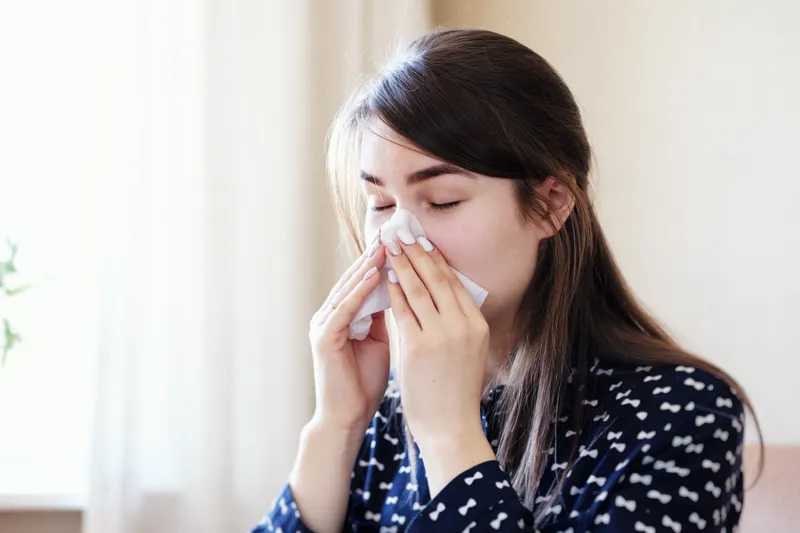How to deal with seasonal allergies
Seasonal allergies can be related to the respiratory system, skin, or can also be headaches and congestion in the head. The key point is healthy digestive function and leading an active lifestyle.
A common thing I hear is people complaining of seasonal allergies. I was watching a health practitioner a few days ago speaking about using echinacea for seasonal allergies at the first sign of an attack.
Are seasonal allergies a real thing? This question has some nuances to it. I totally hear you saying they are real as you suffer from them all the time. Be patient with me. I resonate with your discomfort as you are the sufferer. The only thing that I want to add is that palliative remedies only skim the surface. There is a reason why your immune system is responding on overdrive, as it is. It’s important to get to the roots and there can be several reasons why you are more susceptible to seasonal allergies than your friend.
What are the symptoms of seasonal allergies?
Symptoms of seasonal allergies can be so many. They can be related to the respiratory system where they show up as sneezing, breathlessness, coughing, asthma, postnasal drip, stuffy nose, sore throat, and constant throat clearing. They can be skin related symptoms such as urticaria, shingles, psoriasis, eczema, rashes, and itching.
Seasonal allergy symptoms can also be headaches, migraines, dizziness, and congestion in the head. Other symptoms include random pains and fatigue, which can also be interlinked with some of the other symptoms. If you are suffering from any of these, I totally empathise with you. These can be dreadful.
Some root causes interlinked with seasonal allergies
The reason they are called seasonal allergies is that they tend to occur on the cusps between seasons.
The effect of seasons is reflected as a negative impact on those bodies that are in a state of imbalance, which are unable to gently ebb and flow with these seasonal shifts.

Image: Shutterstock
1. Digestive strength weakens at these times, and when we do not support strong digestion, we feel the impact. This is because low digestive function leads to poor utilisation of food and increased creation of metabolic waste. Combined with a congested detoxification system such as a fatty liver or congested lymph, the body feels this impact.
Mucosa Associated Lymphoid Tissue is a concentration of lymph tissue in all the areas where you have mucosa or wet tissue. This is found within your respiratory system, digestive system, urinary system, and reproductive system. Bronchial Associated Lymphoid Tissue is a concentration of lymph tissue in your respiratory system. When the entire lymphatic system is blocked, seasonal shifts can cause symptoms, including those described earlier.
2. Body constitution plays a key role in our tendency to react adversely to seasonal shifts. Kapha constitutions in ayurveda can be more prone to sinus related symptoms. Excess kapha can show up as having mucus, which is sticky and white colored phlegm.
However, the thing to keep in mind is that this should only happen in a system that is out of balance. The season shifts only wreak havoc when we do not support the body appropriately at those times.
Since seasonal shifts are times where digestion weakens and cause increased accumulation of toxic waste, it is up to us to support healthy digestive function by consuming easy to digest foods, not overeat, and have adequate movement to support optimal detoxification.
3. The third reason why we might be more prone to seasonal allergies is histamine elevation. Histamine is broken down by DAO (diamine oxidase), an enzyme normally produced in your intestinal lining. If you’re deficient in DAO, you will have trouble clearing histamine from your system. Poor gut health (including imbalanced fungus and bacteria, aka dysbiosis) may damage the lining of your intestine. Because this is where the DAO enzyme is produced, a damaged gut lining leads to lower DAO levels.
The double whammy here is that dysbiosis (imbalanced bacteria and fungus) can also lead to an increase in the production of histamine. So, dysbiosis contributes to histamine intolerance via both an increase in the production of histamine and a decrease in the clearance of histamine. While lowering histamine from foods temporarily during seasonal shifts can help, it requires working with a practitioner. What you can do is to keep digestive health robust.
4. Micro-organisms within the oral cavity and their interaction with other species as well as the host species is studied in oral microbiology. The mouth is suited to the growth of specific species, based on a number of factors, which includes the pH. Some dysbiosis in the microbiome has been shown to cause many teeth infections, and there is more and more evidence to the state of the oral microbiome having a connection with many systemic disease, including CVD, stroke and diabetes. With the understanding that these surfaces are covered by a complex biofilm of multiple microbial communities, there is more focus today on rebuilding the mouth microbiome rather than targeting a single infection, which can become recurrent. An unhealthy oral microbiome can be a reason why you quickly react to seasonal shifts.

Image: Shutterstock
What should you do to support your body through the seasons?
1. The key point is healthy digestive function. Typically, in summer, the digestive fire goes down as the body is trying to cool itself. It requires lightening the load of digestion through easier to digest foods. The best way to know if you have weak digestion is to notice if you have hunger before the next meal. If you do not feel hunger, it is a sign that you have eaten too much at the previous meal or that you have weak digestion.
2. Having no exercise can congest the lymphatic system making you further prone to seasonal allergies. As seasons start to shift, be intentional with daily exercise, whether it is getting 10,000 steps every day or moving the body through suryanamaskars.
3. Avoid drinking cold water with your meals. The cold constricts blood vessels in the gut, reducing digestive function and weakening the stomach acid. This can almost immediately make you react to the seasons. Avoiding cold water has immense science to it.
4. Oil pulling with a capful of sesame oil, a pinch of salt, a pinch of turmeric and one drop of tea tree oil, gargled for 10 minutes is a great way to have a health oral microbiome. Gargling also improves vagal tone, which has an immediate positive effect on digestive function.
Arm yourself through the seasons
Anything that weakens digestion further will increase your susceptibility to seasonal allergies. Keep digestion strong, and you really will not need palliative remedies. You’ll be able to clobber the virus around you through those seasonal cusps!
Edited by Megha Reddy








